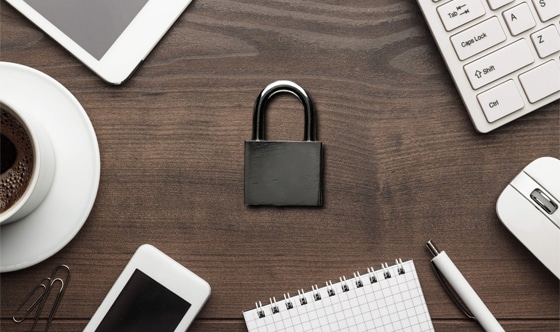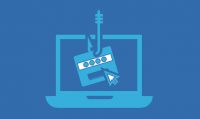Fraud is an ever-growing issue that affects more and more people every day. To protect yourself and others, it’s important to understand how to recognize fraud, identity theft, and cyber security threats. If a situation has occurred, there are steps you can take to safeguard yourself from further fraudulent activity. HRCU recommends that online business members perform an IT risk assessment and evaluate their security controls periodically.

Protect Yourself from ID Theft
There are many precautions you can take to protect your private information from potential threats.
- Review your account frequently by utilizing HRCU’s OutReach 24/7 Mobile, Online, or Audio Access System. If you don’t have the ability to use the OutReach 24/7 System be sure to review you monthly or quarterly statements for irregular transactions.
- Shred important documents before discarding them.
- Make strong complicated passwords for all your logins/devices.
- Keep password and login information in a secure location.
- Change your password on a normal basis.
- Keep your devices up-to-date when new security patches are released.
- Don’t login to important websites while on an unknown network/public Wi-Fi.
- Check your credit report for free at annualcreditreport.com.
- Never provide your Social Security Number, account information, PIN, or any other personal/sensitive information to anyone over the phone, by text, or through email if you don’t know who they are or if you didn’t initiate first contact.
- Active duty military personnel should put an “Active Duty Alert” on their credit report.
- Additional Resources & Information:
Beware of Scams, such as:
Cat Phishing
An internet scam where someone creates a fake profile on social media sites to trick victims into fictitious relationships in order to scam them out of money.

Foreign Lottery Scam
This scam occurs when the victim receives correspondence (via mail, email, text, or by telephone) informing them that they have “won” the lottery in a foreign country and to claim their winnings they must first pay a tax.

Medical Emergency Scam
This scam happens when the victim receives a phone call from a scammer who pretends to be a loved one and claims they have been in an accident and need money for their medical bills.

Incarceration Scam
This is a common scam where the victim receives a phone call from a scammer who pretends to be a loved one and claims they have been arrested domestically or internationally and request money for bail.

IRS Scam
A scam that occurs when the victim receives a phone call from a scammer who pretends to be an IRS agent and claims the victim owes back taxes to obtain their financial information.

Employment Scam
This scam happens when the victim applies for a job online (Secret Shopper is most common) in response to an email or on an untrustworthy website. The scammer will often ask for the applicant’s financial information when they fill out the job application. In some cases, the scammer will mail instructions with a check included, asking the applicant to cash the check and send part of the money back to them via wire transfer, money order, or MoneyGram.

Money Mule Scam
This scam involves a person who is used as an intermediary to launder money for illegal activity. Money mules are often asked to use their account ,or open a new account, to receive and deposit funds by cash, check, or electronically; and then to forward those funds to another person or several other persons. This is done by mailing cash, money orders, MoneyGrams, or wire transfers. The destination to forward the funds are often foreign countries.

Elder Abuse
A situation in which a person (often another family member, caregiver, or someone close to the senior citizen) coerces an elderly person, either mentally or physically, to give up their financial information for the abuser’s personal gain. If you should suspect an elderly person is being abused or you are a victim of elder abuse, call 1.800.490.8505.

Phishing
A fraudulent practice that attempts to obtain personal/sensitive information such as usernames, passwords, credit card info, etc. Phishing occurs when a fake e-mail is sent by a scammer in anticipation of getting a response back. This e-mail may be generic or customized depending on the type of information the scammer is attempting to obtain. Never give out any personal information through e-mail unless you are sure of from where the request for information is coming.

SMiShing
Similar to phishing, this scam attempts to obtain personal/sensitive information such as username, passwords, credit card info, etc. SMiShing occurs when a text message is sent from a fake/unknown number in anticipation of receiving back personal information from unsuspecting victims. Never provide personal information via text message unless you know of from where the request for information is coming.

Vishing
Similar to phishing and smishing, this is a fraudulent practice that attempts to obtain personal/sensitive information such as usernames, passwords, credit card info, etc. Vishing occurs when a scammer cold calls random individuals in anticipation of obtaining personal information. Most of these calls are an automated message; however, some are an actual person on the other line requesting the call recipient’s personal information. Please hang up if you receive a phone call from an unknown number requesting information that you are unsure/unaware about. Never give your personal information out unless you are sure of from where the request for information is coming.

Skimming Scam
A scam in which a skimming device is placed on an ATM or merchant card reader that, when used, attempts to steal the information on your debit card as well as the PIN number. Often these devices are designed to fit directly over the current card reader. These devices are often difficult to detect. Should you notice something unusual or different than normal with an ATM or card reader at a merchant, do not attempt to use or remove it and please inform the owner of the ATM/card reader.


Actions ID Theft Victims Can Take
If you or someone you know has fallen victim to identity theft or other fraudulent activity, proceed with the following steps:
- Notify all the financial institutions you have an account or credit with that you were a victim of Identity Theft. This may require you to close existing accounts and open new accounts.
- Notify the three major credit agencies that you were a victim of Identity Theft and ask them to put a fraud alert on your credit report.
- Experian – 1.800.397.3742
- TransUnion – 1.800.680.7289
- Equifax – 1.800.525.6285
- Contact local law enforcement.

Lost or Stolen Card?
If your card is lost or stolen, call HRCU at 570.622.3399 during regular business hours or contact 888.241.2510 after business hours. You may also want to freeze your card by adjusting the settings in your online account. Login and click on Settings, then select ATM/Debit Card from the sub-menu. Check the Block box to deactivate your card and click Submit.
Important: This block is immediate and can only be reversed by an HRCU employee.
Please note: You must reach out to HRCU during regular business hours if you need a new debit card. A new card will not be issued automatically.
